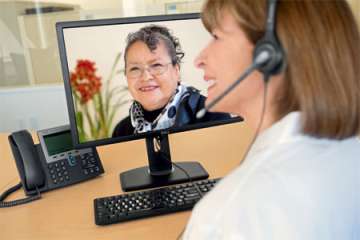Telemedicine and Remote Second Opinion
Find your care
Our expert neurosurgery team is committed to providing the finest and most comprehensive patient care. For help finding a neurosurgeon, call 310-825-5111.
UCLA Connected Health Neurosurgery Telemedicine – Virtual Video Visits
Over the past several years, UCLA Health has expanded access to neurosurgery telemedicine services to patients outside the immediate Los Angeles area.
Virtual neurosurgery consultations are performed using a secure web channel to ensure your privacy. Some limitations may apply depending on insurance status. Ask our staff if it is appropriate for you to set up a telemedicine appointment with the UCLA Department of Neurosurgery.

What are UCLA Connected Health video visits?
Instead of driving to your doctor’s office for an exam, virtual neurosurgery consultation or follow-up appointment, you can connect with your physician using web-based technologies on your computer, tablet or smartphone. You can discuss symptoms or post-surgical recovery, as well as diagnosis and treatment plans, without having to leave your home or workplace. In other words, it’s just like a regular appointment with your doctor, only more convenient.
Are video visits covered by insurance?
Many health insurance companies cover video visits. Just like a regular visit to the doctor’s office, you may have a copay. You should check with your insurance provider to make sure your video visits are covered and to find out your copay amount. Medicare covers visits only if you live in an area that has a shortage of doctors.
Are video visits secure?
Yes! UCLA Connected Health uses a HIPAA-compliant method for conducting video visits. This means the information is securely transmitted and is treated the same way it would be if you were meeting with your doctor in person.
What do I need in order to participate in a video visit?
You’ll need access to:
- A reliable, high-speed internet connection
- A computer, smartphone or tablet with a video camera and microphone
- A valid email address
- Ability to upload your medical records and images using a link provided on an individual basis.
To make a Telemedicine appointment with a UCLA neurosurgeon, please call 310-825-5111.
Remote Second Opinion for Neurosurgery patients outside California
Unfortunately, due to the limitations with state medical licensing, we cannot offer a consultation directly to an out-of-state patient. The Remote Second Opinion Program is a service offered to patients with an established diagnosis seeking to obtain an expert second opinion for out-of-state patients. The key is the designation and communication with a referring physician located in the patient’s state. A written referral from patient’s treating physician is required. The fee for a remote second opinion (teleconsult, videoconsult or written) is $1,000. (Due to state regulations and restrictions, the program is not available to residents of North Dakota.)
These programs are NOT designed to handle medical emergencies. If this is a medical emergency, please immediately call your local emergency service number to get prompt medical attention, or go to your nearest hospital, emergency room, or urgent care center.